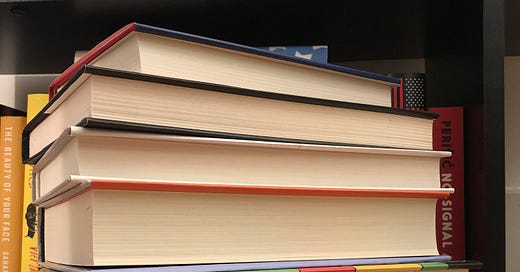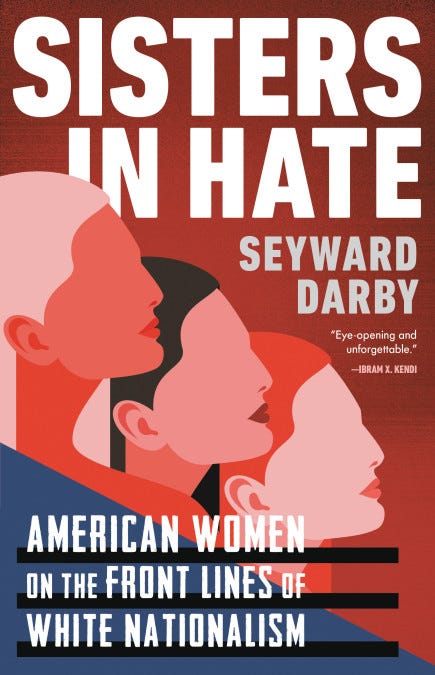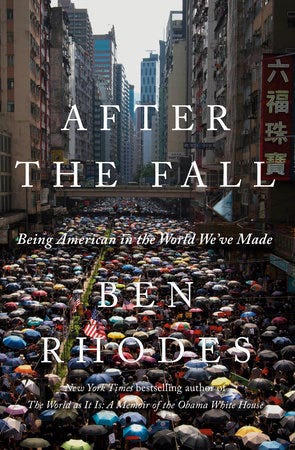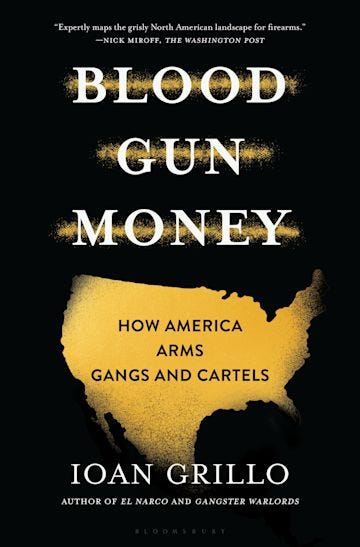Welcome to the second edition of this three-part series revealing my favorite reads of 2021. In this post, I am excited to announce the best non-fiction that I read this year. If you missed the first edition, my favorite fiction of 2021, you can find that list here. Stay tuned for the final post in this series, which will include my five favorite books across all genres this year.
Although I am also interested in foreign policy, most of my favorite non-fiction this year centered around issues within contemporary American politics, such as gun violence, white nationalism, and the criminal justice system. Each one of these books is both well-researched and well-written and include topics that made me think, which is exactly what a good book should do.
7. The Violence Inside Us - Chris Murphy
Gun Politics/Gun Violence
On December 14, 2012, Chris Murphy was with his family when he received news of a shooting that had just taken place at an elementary school in Sandy Hook, Connecticut. As a sitting Connecticut congressman and soon to be senator, Murphy quickly traveled to the scene and watched in horror as parents were given the news that their child had been killed. Sandy Hook became Murphy’s call to action and preventing gun violence has since become his signature issue. In The Violence Inside Us, Senator Murphy makes a strong argument for why it is imperative that Congress prioritize gun policy reform not just because it is the morally correct thing to do, but also because the data shows that gun control saves lives. This was a fascinating book that approached guns and gun violence from different angles, including mass shootings, street violence, the exporting of firearms, as well as the infrastructure surrounding gun manufacturing. Murphy is also quick to identify the privileges in his perspectives, such as the fact that he only became interested in the subject after a high-profile mass casualty event despite growing up just miles from daily violence taking place in inner-city Hartford.
As sometimes happens in books that are broad in scope, Murphy lost some of his focus when trying to apply the larger biological origins of violence to America’s military industrial complex. While these foreign policy sections were well-written and certainly remind readers of his placement on the Senate Foreign Relations Committee, general conversation about American foreign policy could have been saved for another book. When not writing about foreign policy, The Violence Inside Us was comprehensive and compelling, making a strong argument for why less guns leads to less violence.
6. Sisters in Hate - Seyward Darby
White Nationalism/Domestic Extremism
In Sisters in Hate, Darby writes about the role of white women inside the white nationalist movement and how they have shaped and aided in its development. The underpinnings of this book focus on ideology, guiding principles, and conspiracy theories. Darby is also a good storyteller, and has chosen to focus on three separate women in order to highlight three separate elements of white nationalism. The first woman’s story allows Darby to explore the foundations of white supremacy and hate as well as the way that people searching for belonging are attracted to what alt-right groups have to offer in terms of a (distorted) sense of community. The second woman’s story emphasizes how traditional gender roles have given some isolated women a space for identification and validation of a white identity that they believe is under attack. The final woman’s story highlights the monetization of conspiracy theories and draws attention to the ways that pernicious actors have profited from the spread of hate and misinformation. Sisters in Hate shows how some women have been sadistically empowered by the tenets of a system that believes in female subjugation through extremely traditional gender roles and the degradation of anyone who is not white.
I recommend this book for anyone who learns best by reading about the first-hand experiences of others. Indeed, it is the structure of this book and its focus on individual experience that makes it so successful in conveying the motivations and dangers of the alt-right and which sets it apart from other books written on the same subject.
5. After the Fall - Ben Rhodes
Democracy/Autocracy
For eight years, Rhodes worked closely with Obama to shape foreign policy and national security decision making as a senior national security advisor. Some of Rhodes’ notable achievements included the crafting of the Iran Nuclear Deal and his role as a lead negotiator to open relations with Cuba. Not only was Rhodes out of a job after Trump was elected, but his two signature accomplishments were reversed, leaving him searching for personal meaning and questioning America’s shifting direction.
After the Fall is his response: a type of follow-up to his memoir about his time in the White House. In his second book, Rhodes reckons with the spread of authoritarianism around the world and the role of the United States in this rise. The book is divided into four sections: the first focuses on the erosion of democratic norms in Viktor Orban’s Hungary; the second is about authoritarianism in Russia under Vladimir Putin; the third is centered around the Chinese government’s attempts to maintain power through the destruction of individual freedom; and the final section follows Rhodes’ personal development as well as America’s democratic struggles. One of the most striking scenes of the book comes near the end, when he retells his 9/11 experience of working the polls on the Brooklyn waterfront and watching as the two planes hit each tower, ultimately fueling his desire to work in government. In many ways it was America’s response to 9/11, Rhodes argues, that destroyed global confidence in the superpower status that the United States had previously occupied and justified doubts that democracy is the best option for governance. Although Rhodes sometimes leans a bit too hard on metaphors, there is no denying that he is a very gifted writer; and able to translate weighty thoughts on important topics into readable, lyrical sentences.
4. We Own This City - Justin Fenton
Crime and Policing, 270 pages
Justin Fenton is a crime and courts reporter for the Baltimore Sun and a Pulitzer Prize finalist for his reporting on the riots in Baltimore following Freddy Gray’s death in police custody in 2015. We Own This City, however, is only tangentially connected to Freddy Gray and the legacy that his death had on policing in Baltimore. Rather, the book is about endemic corruption within the Baltimore Police Department, particularly within the Gun Trace Task Force, an elite plain clothes unit led by Wayne Jenkins. For years, Jenkins and his team robbed citizens in a city they were tasked with protecting. Aware of the profit they could make and the limits of oversight within the police department, Jenkins and his team would steal drugs and money taken during arrests for personal gain. Sometimes, absent probable cause for a stop, members of the Gun Trace Task Force would orchestrate stops using planted evidence, resulting in countless wrongful convictions and lives ruined. In a city with high rates of violent crime, leadership was unwilling to look too closely at a unit that on paper had gotten results, even if those results came at the expense of the rule of law. While the book was about corruption within the Baltimore Police Department, We Own This City can also serve as a cautionary tale for the dangers of letting police departments operate in insular and unchecked ways.
3. Let The Lord Sort Them - Maurice Chammah
Criminal Justice/Death Penalty
This was an incredibly powerful and persuasive book. Told using legal arguments and from the perspectives of the people making those arguments rather than from the inmates on death row themselves, this book painted a comprehensive picture of the death penalty in the United States. Although it is billed as chronicling the death penalty’s “rise and fall,” I’m not sure that the argument for “the fall” was particularly convincing or apparent, especially in Texas where the majority of this book takes place. Chammah is less focused on determining the justification for the death penalty in moral terms, and instead spends his time making the case for why the death penalty should be abolished on legal grounds alone. Chammah makes a convincing argument that there is no fair legal standard that can apply to who gets sentenced to death and who does not. As a result, the odds of getting a death sentence and then being killed by the state is akin to getting struck by lightening and depends on the varying factors of where one lives, what the population’s opinion towards the penalty is in that location, and too often, the race or gender of the defendant in question. This is a book that will make you think and think again, and taught me a whole lot about a subject I thought I already knew a lot about.
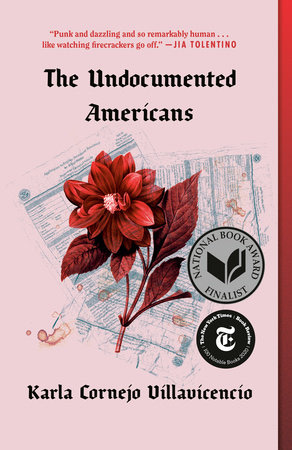
2. The Undocumented Americans - Karla Cornejo Villavicencio
Karla Cornejo Villavicencio is a brilliant writer. The Undocumented Americans is both a memoir and contemporary history of the lives and circumstances of undocumented people in the United States. Brought to America at a young age from Ecuador, much of Villavicencio’s life was defined by her lack of legal status. Although she is now a DREAMer, attended Harvard for undergrad, and is currently a PhD candidate at Yale, her parents remain undocumented and this stress overshadows all of their lives. Growing up with these realities, Villavicencio asks a central question throughout the book: what happens when a person lives in the liminal space between the idealism of the American dream and a country that tries at every turn to make the attainment of this reality as difficult as possible? The way that Villavicencio weaved her personal story, the story of her family, and the stories of the people she met, all while telling the larger story of undocumented people, was absolutely masterful. In just one page her sarcasm would make me laugh in the first paragraph and the next paragraph would make me want to sob. She gave humanity to people that are often either written off or ignored in the best of circumstances and deeply brutalized in the worst. The combination of these two experiences, willful ignorance mixed with brutality, deeply disrupted any lingering belief that I may have had in the purity of the story of the American dream. Villavicencio frequently states that she is not writing to change people’s minds but I hope that minds have been changed after picking up this powerful and moving book.
1. Blood Gun Money - Ioan Grillo
Gun Trafficking/Gun Politics
Ioan Grillo is a British journalist who writes for the New York Times based in Mexico City, Mexico. He has spent years covering the violence of organized crime, cartels, and gangs in Mexico, Central and South America. A crucial part of his coverage that is distilled in this book is where and how these organizations get their guns. The answer is simple. Because of lax gun restrictions, a crippled ATF, and poor enforcement, nearly all of the guns come from the United States. In one shocking section, Grillo writes about straw purchasers - people who can easily pass background checks if there are any even required - who walk into gun stores or gun shows and buy fifty or more semi-automatic weapons at a time and then walk out and sell them to the closest gang or cartel for a high-markup. Although this might seem crazy, there is very little that can be done about this under our current legal framework because of all the legal loopholes that make it perfectly legal to buy and sell high-grade and high-capacity weapons with abandon. The ATF, the agency tasked with investigating and taking down gun traffickers and people selling to organized syndicates, has been intentionally stripped down by conservative lobbyists and lawmakers so as to make basic tasks, like tracking guns used in crimes, extremely inefficient and time consuming. High profile scandals, such as Fast and Furious, have allowed criticisms of the agency to be used as justification for ignoring simple fixes, (like allowing records to be digitized in a single database, something that is shockingly currently not allowed), instead of working to make the agency more effective at stopping illegal transfers of firearms.
With constant talk about a crisis on the southern border, I think that Grillo makes compelling arguments about the ways that gun laws in the United States contribute to and in many ways exacerbate the issues that people are trying to flee. By inadvertently supplying so many guns, we are contributing to immense violence and impossible living conditions. Although the United States also has lots of guns and has a serious issue with gun violence, the homicide rates or random ambushes are not nearly as high as those in say, Honduras or Tijuana, Mexico. Grillo posits that this is the case only because of the strength of our institutions, and if we continue to degrade them then we too will become susceptible to a breakdown in standards of safety.

